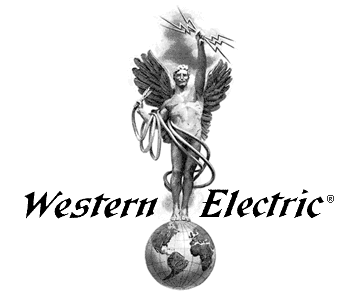The Heritage and History of the -
Altec Lansing Corporation

The Heritage and History of the -
Altec Lansing Corporation

The history of the company we now know as the Altec Lansing Corporation goes back to the World War I era. During the rush to get the "doughboys" to Europe, it was decided that the traditional method of training a soldier to use a rifle, for example, was too slow. One man training another man, one-on-one, simply had to be eliminated in favor of a more rapid, and uniform method. It was decided that it would be a good idea to use the motion picture to do this, and so the first of the famous "Army Training Films" was born.
![]() was there at
the inception of this revolutionary concept.
was there at
the inception of this revolutionary concept.
Someone in the bowels of the Western Electric Company - we will never know who - got the idea that if a moving picture could help the men learn how to use the Army rifle, one that talked could do it even better. Thus, the search to bring sound to the motion picture was born.
Now, the Bell Laboratories had the BEST men in the world working for them at that time. Great men like Wente, Thuras, and so on. These men, and dozens like them, were put to the task of making motion pictures talk.
The men of Western Electric, due to their background with the telephone, naturally sought to design and build a "loudspeaking telephone," as they were called, that would do the job. the result was a large, single transmitter mounted on a curving, single horn. It worked.
Contrary to the advertisements run by JBL over
the years, it as ![]() that first edge-wound
copper ribbon for the voice coil of a compression driver. The 555
driver manufactured by W. E. also used the first annular slit style of
phasing plug later attributed by JBL aficionados to James B. Lansing.
that first edge-wound
copper ribbon for the voice coil of a compression driver. The 555
driver manufactured by W. E. also used the first annular slit style of
phasing plug later attributed by JBL aficionados to James B. Lansing.
With the
advent of talking motion pictures, ![]() inserted itself into the new medium with the
full force of the powers and money of the telephone company and
research facilities of Bell Laboratories. They soon dominated the
marketplace, as well they should have, for theirs was THE BEST
equipment at the time.
inserted itself into the new medium with the
full force of the powers and money of the telephone company and
research facilities of Bell Laboratories. They soon dominated the
marketplace, as well they should have, for theirs was THE BEST
equipment at the time.
 Early systems employed
the now-famous 555 compression driver (left), coupled to a curved
"theatre" horn. This provided acceptable frequency response and high
efficiency - something needed in those days due to the cost of audio
amplifier power.
Early systems employed
the now-famous 555 compression driver (left), coupled to a curved
"theatre" horn. This provided acceptable frequency response and high
efficiency - something needed in those days due to the cost of audio
amplifier power.
Some of these systems were quite huge.
This page will
be updated as the days pass on . . .
BACK TO ALTEC LANSING'S (unofficial) HOMEPAGE
![]() E-mail us at: toddw.white@netzero.net
E-mail us at: toddw.white@netzero.net

The Sound of Experience
This page still under construction. Date of last revision: May 2, 2002
Copyright © 1999, Todd W. White.
Permission to use and distribute is granted to anyone who wishes to,
providing it is not changed or altered in any way
from it's original form, and clear reference is given as to it's origin.